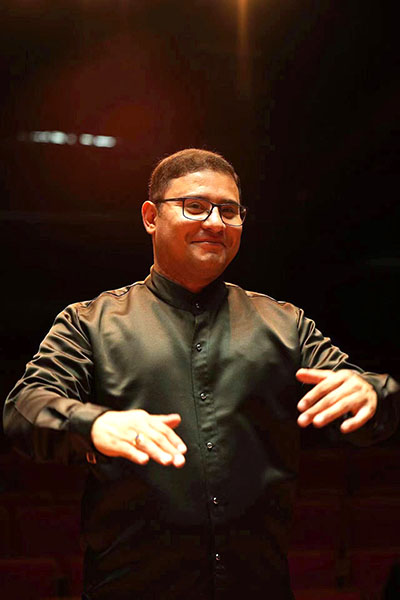A musical odyssey from Costa Rica to Shanghai


On March 18, 2018, I was alone at home in San José, Costa Rica, drinking a cup of tea, unaware that my life was about to change. I received an e-mail notification with the subject "scholarship selection result".
My heartbeat quickened as I read through it, and I felt a bit of heavenly bliss: I had been chosen to receive a full scholarship for a master's degree in conducting at the Shanghai Conservatory of Music. Finally, I would be able to delve into the ancient tales of dragons and the old legends of China, which had always fascinated me.
Five months later, I arrived in Shanghai, stepping into an entirely new world. At the airport, two of my Costa Rican friends were waiting for me and accompanied me to the dormitory at Lingling Road.
I remember clearly when I approached dorm building No 3, being drawn by the sweet melody of a dizi (Chinese flute), which was totally different from all that I used to hear in my country.
The next day I went to the campus at Fenyang Road, and those buildings blew my mind since the music school I came from is really small in comparison.
In Costa Rica, I learned the conducting technique well. However, it was my professor, Cao Tongyi at the Shanghai Conservatory of Music, who guided me in elevating my skills. His teachings emphasized not only meticulous attention to detail but also the art of letting the music flow as gracefully as tai chi.
In my opinion, that's the essence of life in China. You can see it on every corner when you notice how the traffic flows or on the way people walk to the subway, and even on how the delivery system works throughout China. Similarly, music can transcend the confines of notation and paper, flowing from the musician to the audience, enriching the world one note at a time.
During the COVID-19 pandemic, I had to go back to Costa Rica, but I already held a piece of China in my heart.
There, I taught music lessons in a school. One day, I introduced the Chinese folk song Molihua, meaning jasmine, to my 3rd- and 4th-grade students. Their first reactions were very interesting: some of them liked the melody while others were confused about the pronunciation, particularly the sound "zh", which we don't have in Spanish.
The next week, some of my students were asking more about China and its people, so I dedicated my music classes to talk about it and to listen to more Chinese music. Weeks later, the entire school questioned why only certain grades had been selected to sing this beautiful song — a response that pleasantly surprised me. Then I knew that music is one of the best ways to show people about the culture of another country.
Months later, my students and I crafted a video performance of Molihua to commemorate the 72nd anniversary of the founding of the People's Republic of China. The Chinese Embassy in Costa Rica shared it across its social media platforms.
This year, on March 8, I was finally able to return to Shanghai to finish my master's degree, to meet again with my friends and colleagues, prepare a concert with The Voice of the World Choir (from the International Education Division of Shanghai Conservatory of Music), and continue my exploration of China through its music. Words fall short in expressing the sheer delight and gratitude I experience, and every single day I feel blessed to be here.
In my opinion, Shanghai is becoming the global center of classical music. Here, you can attend concerts of great artists such as Chinese pianists Lang Lang and Wang Yujia as well as American mezzo-soprano Joyce DiDonato, German soprano Diana Damrau, alongside orchestras including the London Symphony Orchestra, the Shanghai Symphony Orchestra, and the China National Opera House Choir.
In addition, the ingenuity of Chinese composers such as Tan Dun is truly impressive. He uses water as a musical instrument and integrates paper sheets to evoke unique sensations in contemporary Chinese opera — an opportunity unavailable elsewhere.
It's also a delightful experience to enjoy a mixture of Western and Chinese music when you attend concerts with different styles or even adaptations of renowned compositions such as The Phantom of the Opera: which debuted its Chinese rendition at the Shanghai Grand Theatre in May.
Studying in China and immersing myself in its music has been a wonderful journey of discovering new harmonies rooted in the pentatonic scale, introducing me to diverse sounds produced by Chinese musical instruments like the erhu — a two-stringed bowed musical instrument — and the suona — a woodwind instrument.
From now on, my mission is to share this amazing musical experience worldwide, which is the reason I'm currently working on to bring a new music proposal with a choir and orchestra to the stage in the upcoming months. I hope to spread the joy of music far and wide and I believe my aspirations will flourish here in China.
Written by Edwin Montealegre, a 37-year-old Costa Rican citizen and music conductor with a Master of Arts degree from the Shanghai Conservatory of Music. Currently, he is in the process of establishing a music company for performances in Shanghai.




































